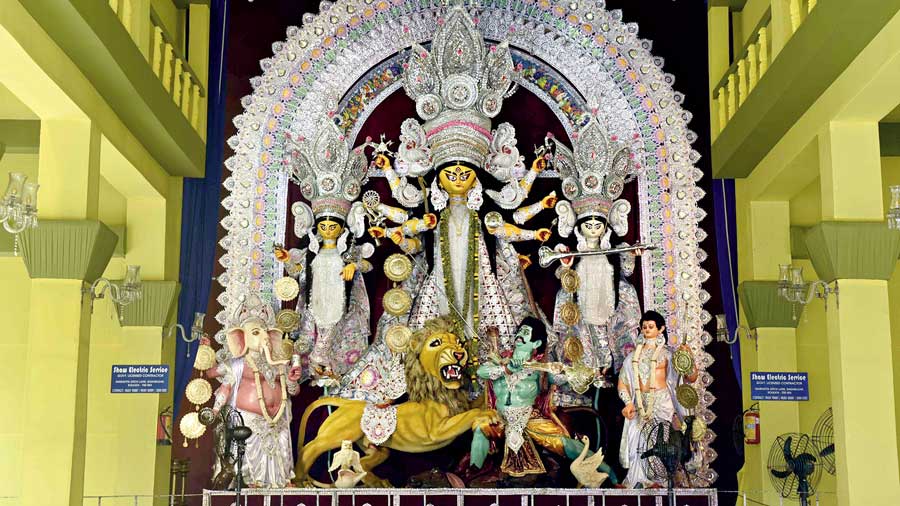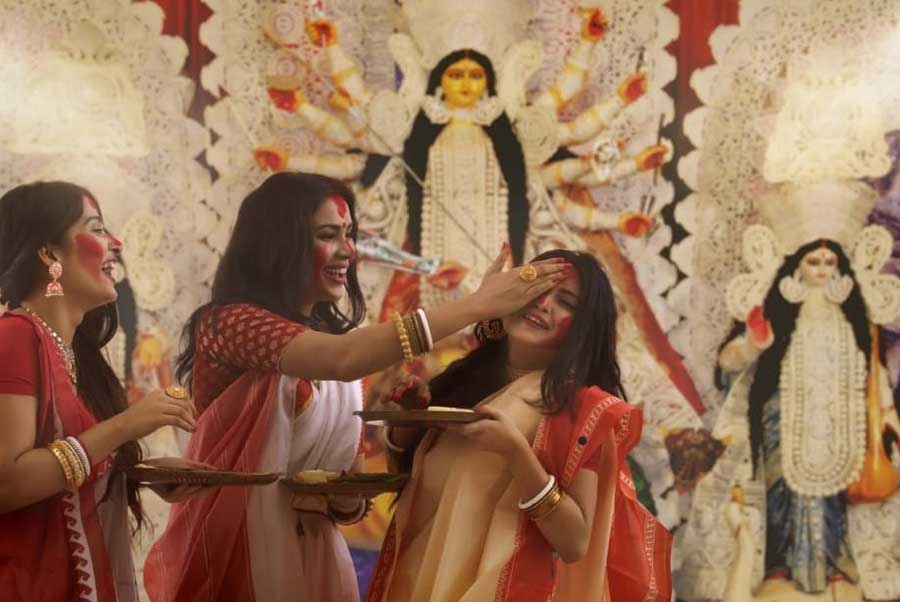Durga Puja in Kolkata is now “inscribed on Unesco’s Representative List of Intangible Cultural Heritage of Humanity”, a tag that formally takes the city’s much loved carnival to the global stage.
“Durga Puja is seen as the best instance of the public performance of religion and art, and as a thriving ground for collaborative artists and designers. The festival is characterised by large-scale installations and pavilions in urban areas as well as by traditional Bengali drumming and veneration of the goddess. During the event the divides of class, religion and ethnicities collapse as crowds of spectators walk around to admire the installations,” the Unesco website reads.
Unesco on Wednesday tweeted: “Durga Puja in Kolkata has just been inscribed on the #IntangibleHeritage list. Congratulations #India”.
Durga Puja made it to the list, along with Arabic calligraphy and Congolese Rumba, during the 16th session of Unesco’s intergovernmental committee for safeguarding of the intangible cultural heritage, which is being held virtually in Paris from December 13.
The inclusion means Durga Puja will feature on global tourist guides and Puja organisers in Kolkata are already excited about the possibility of more visitors to their pandals.
Bengal tourism secretary Nandini Chakraborty feels this will give a huge boost to tourism. “Like Tomatino and Rio Carnival, Durga Puja will definitely be on the world map of tourism,” she said.
Former culture secretary Jawhar Sircar was not so sure. “Tangible heritage still is a far bigger draw than intangible heritage. Wherever there is a monetised economy, tangible heritage is very strong. It is only in developing economies that intangible heritage becomes stronger. But still this inclusion is a huge prestige, no doubt.”
The Toy Train in Darjeeling is a tangible heritage on the Unesco list.
The application for Durga Puja’s inclusion was made by the Union culture ministry in 2019 when Sangeet Natak Akademi had asked art historian Tapati Guha Thakurta to compile a dossier.
On Wednesday, sources close to Guha Thakurta said the dossier presented “a people’s festival in Kolkata” despite pressure from sections of the Union government to make a case for “Durga Puja across India”.
The application stated that Durga Puja, though originally “a Hindu religious event, but now the celebrations transcend all barriers of religion and creed, making it a grand celebration, an exultation of spirit”.
Guha Thakurta told The Telegraph: “Although Durga Puja is observed all over India and abroad, our application gave it the locational specificity of the city, besides the inclusiveness, the gender participation and several other aspects of our puja.”
There were 80 signatories who supported the application, including the Puja committees and artists that proved the community participation in the festival.
Guha Thakurta said: “That is one of the key factors in clinching the title so to say. The Unesco form is very straight-jacketed. We hardly got to elaborate on the festival. But one thing it did ask for is locational specificity. Like the predecessors who were included on the list, the Kumbh Mela, the Buddhist chanting in Ladakh, the Kalaripayattu of Kerala, all had regional specificity.”
The community Durga Puja in Kolkata dates back to 1790. “These are now organised by residents of different localities, which add a unique social dimension to the festival. Over the years, the social-liberal polity of Bengal has accommodated a vast range of socio-cultural themes as well as various folk art and craft forms in the design of the idols, pandals, and illumination at the community Durga Pujas, thus making it the greatest public installation in the world,” the dossier says.
While the application was made in 2019, Unesco started asking a lot of questions last year about how sustainable it was, how inclusive it was and finally, can it be on an international stage.
“We had to answer whether it was feasible for Durga Puja to become an international tourist event. I personally think a lot of it is already on the international stage,” said Guha Thakurta.
Sircar and Guha Thakurta hoped creative artists would really benefit from the tag. Mintu Pal, an artisan from Kumartuli, hopes his international orders for Durga idols will increase. “After the pandemic, orders had dwindled. Hope this revives our business,” he said on Wednesday.

